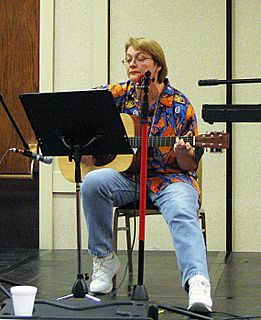A Quote by Art Spiegelman
Samuel Beckett once said, "Every word is like an unnecessary stain on silence and nothingness." ...On the other hand, he SAID it.
Related Quotes
Dexter thrust a pamphlet into Samuel's hand. "Greenstreet Mission. We're doing a Christmas dinner. You can get a meal and hear the word of God." Samuel smiled in relief. This, finally, he understood. "Which word?" "What?" "Well, God's said a lot of words, you know, and a word like 'it' or 'the' wouldn't be worth hearing again but its always fun listening to Him try and say aluminum.
My life is like shattered glass." said the visitor. "My soul is tainted with evil. Is there any hope for me? "Yes," said the Master. "There is something whereby each broken thing is bound again and every stain made clean." "What?" "Forgiveness" "Whom do I forgive?" "Everyone: Life, God, your neighbor especially yourself." "How is that done?" "By understanding that no one is to blame," said the Master. "NO ONE.
Look. We both know life is short, Macy. Too short to waste a single second with anyone who doesn't appreciate and value you." You said the other day life was long," I shot back. "Which is it?" It's both," she said, shrugging. "It all depends on how you choose to live it. It's like forever, always changing." Nothing can be two opposite things at once," I said. "It's impossible." No," she replied, squeezing my hand, "what's impossible is that we actually think it could be anything OTHER than that.
Are you done yet?' Issac called Charles tilted his head back and called back, 'I suppose that's why they call you the five minute wonder.' Anna could feel her eyes round and her mouth drop open 'I cant believe you just said that' She paused and reconsidered. 'I am so telling Samuel you said that.' Charles smiled. kissed her gently, and said 'Samuel won't believe you.
Silence is Golden; it has divine power and immense energy. Try to pay more attention to the silence than to the sounds. Paying attention to outer silence creates inner silence: the mind becomes still. Every sound is born out of silence, dies back into silence, and during its life span is surrounded by silence. Silence enables the sound to be. It is an intrinsic but unmanifested part of every sound, every musical note, every song, and every word. The unmanifested is present in this world as silence. All you have to do is pay attention to it.
Samuel Beckett is the person that I read the most of - certainly the person whose books I own the most of. Probably 800 or 900, maybe 1,000 books of just Samuel Beckett. By him, about him, in different languages, etc. etc. Notebooks of his, letters of his that I own, personal letters - not to me, but I bought a bunch of correspondence of his. I love his humor, and I'm always blown away by his syntax and his ideas. So I keep reading those.
He was talking about the sign that said 'THE COMPLICATED FUTILITY OF IGNORANCE.' 'All knew was that I didn't want my daughter or anybody's child to see a message that negative every time she comes into the library,' he said. 'And then I found out it was you who was responsible for it.' 'What's so negative about it?' I said. 'What could be a more negative word than "futility"?' he said. '"Ignorance,"' I said.
Well, that's certainly... adequate," I told him, burying my face in his chest. I knew immediately I'd picked the wrong word. "Adequate?" He took my hand, placed it on the part in question. It immediately began to stir. He moved my hand on it, and I obligingly circled it with my fingers. "This is adequate?" "Maybe I should have said it's a gracious plenty?" "A gracious plenty. I like that," he said.








































